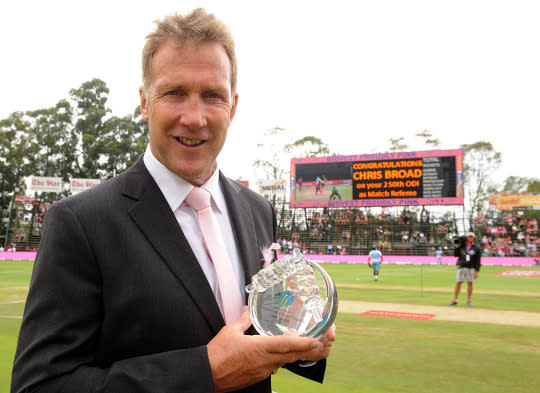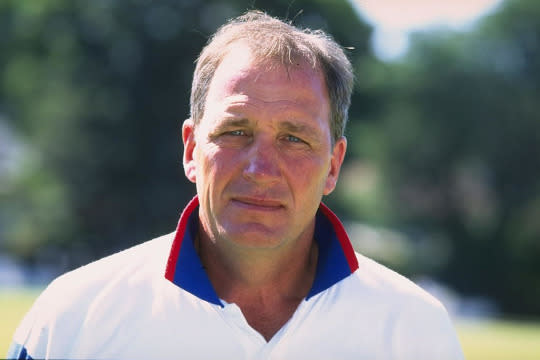Where Are They Now - The England Rebels who sacrificed their international futures to tour South Africa
Ahead of this month’s England Test in South Africa, James Matthews finds out what happened to the 16 cricketers who defied orders and took part in the nation’s Rebel Tour of South Africa in 1990.

Twenty-five years ago, an England team embarked on a tour of South Africa. Unlike Alastair Cook’s men this winter, the 16 in 1990 were controversial Rebels defying their own country.
With South Africa banned from international sport due to apartheid, the group of Englishmen became the seventh set of Rebels to tour. They came in for the most criticism too, as they were being paid by the apartheid-promoting government.
And in making that controversial trip to South Africa – just three weeks before the release of Nelson Mandela, the vast majority cost themselves the chance to represent their country again, hit with three-year bans for their sins.
But what were the consequences for each of them?
Mike Gatting (Captain)
The Rebels were led by Gatting, who embarked on the tour having lost the England captaincy. Perhaps it was in spite more than anything else. He fronted up to the press during the shortened tour, but found himself out of his depth. “I understand a lot more about apartheid now,” Gatting said earlier this year. He did make it back into the England side after serving his ban, playing another 11 test matches. Since retirement in 1998 he has worked as a coach, commentator, with the Lord’s Taverners, MCC and the ECB.

David Graveney
Graveney was player/manager and, having not previously played for his country, the Rebel Tour was the only time he represented England – albeit unofficially. He enjoyed a notable county career and went on to become England’s chairman of selectors for an 11-year period between 1997 and 2008.
Bill Athey
Opening bat Athey paid the price for the Rebel Tour, never representing England again. In truth he was never a mainstay of the side, but this ended any hope he had of becoming a regular. He is now passing on his wisdom to pupils at Dulwich College where he teaches and coaches.
Kim Barnett
Having been given his chance in the England test side, Barnett paid more than most for touring. Capped four times, including three the summer before the South Africa trip, he never got another test call-up. A stalwart of county cricket for many years subsequent, Barnett still plays to a high standard in local leagues.
Chris Broad
From being banned by England to being an ICC referee, Broad finds himself on the other side of the fence now. A controversial character, he waved goodbye to his England career when boarding the plane to South Africa, never adding to his 25 Test appearances. Son Stuart will be in South Africa this winter leading the England bowling attack.

Chris Cowdrey
Cowdrey captained England (following in the footsteps of father Colin) against the West Indies a year-and-a-half before the Rebels Tour. But having been injured for the following game and then dropped, he opted to join Gatting’s tourists and sacrifice any prospect of a recall. Knee injuries forced him to retire just two years later and a career in the media followed.
Graham Dilley
A fine bowler, Dilley died in 2011 aged 52 after being diagnosed with oesophageal cancer. His 41-test England career was still going when he decided to tour South Africa and he was another never to play in another test. He went into coaching before his untimely death.
Richard Ellison
Left-arm seamer Ellison’s decision to tour South Africa was highly likely born out of frustration. He’d been consistently overlooked by England since making his last of 11 test appearances in 1986 despite his exploits in county cricket. He has been a teacher and house master at Millfield School since retiring.
John Emburey
The biggest Rebel of them all, Emburey was touring South Africa for a second time having also been on the 1981/82 tour. He served six years of bans as a result, yet still appeared in 64 test matches. The spinner earned four more caps between 1993 and 1995, before the curtain came down on his controversial career. He captained England twice, losing both matches to the West Indies, in 1988. But almost certainly the decision to tour South Africa cost him more chances to be skipper. Emburey has coached England, several counties and in Pakistan since retiring.

Neil Foster
Foster played just one more test for England after the tour, the quick earning a recall during the 1993 Ashes series. It was the 29th and last time he played for his country, and the penultimate time he played cricket full stop as injuries forced him into retirement. The injury-hit bowler put his problems to good use by qualifying as a physiotherapist.
Bruce French
The wicketkeeper in the touring party, French’s England career already looked to be over after losing his place to Jack Russell in 1988. He accepted that was the case by heading to South Africa. The gloveman has passed on wisdom to the England team as a coach since retiring.
Paul Jarvis
Jarvis was perhaps the biggest loss to England, the fast bowler just 24 and six tests into his international career at the time of the tour. He never regained a foothold in the side either, capped only three more times after the end of his suspension. He continued playing domestically until 2000 and became Director of Cricket at Framlingham College for a time.
Matthew Maynard
Maynard was just 23 at the time of the tour and may well have thrown away the best years of his England career. He had played just once only to be dropped in 1988. By the time his ban was over, he’d missed his chance. He did make three more appearances, but a four-test career didn’t do him justice. He did play ODI cricket as recently as 2000, but it is a case of what might have been. In retirement, he has been assistant coach for England and is now the Director of Cricket at Somerset County Cricket Club.

Tim Robinson
Now an official ICC umpire, Robinson’s 29-test international career ended when he was announced in the Rebel touring party. The batsman was never called upon by his country again, despite a solid career in the county game. He became an ECB umpire in 2007 and made his international debut in 2013.
Greg Thomas
A super-fast bowler, Thomas played in five tests for England between 1986 and 1987 and was well and truly out of the frame when deciding to become a Rebel. He retired in 1991 and little is known of what happened to the quick since.
Alan Wells
Frustrated at a lack of opportunities despite scoring runs for Sussex, the uncapped Wells threw his hat into the ring for the Rebels tour as he desperately sought to play international cricket. It cost him any real chance of making an impact on the national team. He played in one test ultimately, scoring just three runs against the West Indies in 1995, but did lead a young England ‘A’ side on tour in India in 1994/95. He is now director of cricket at St Bede’s School in Hailsham.

 Yahoo Sport
Yahoo Sport 






































